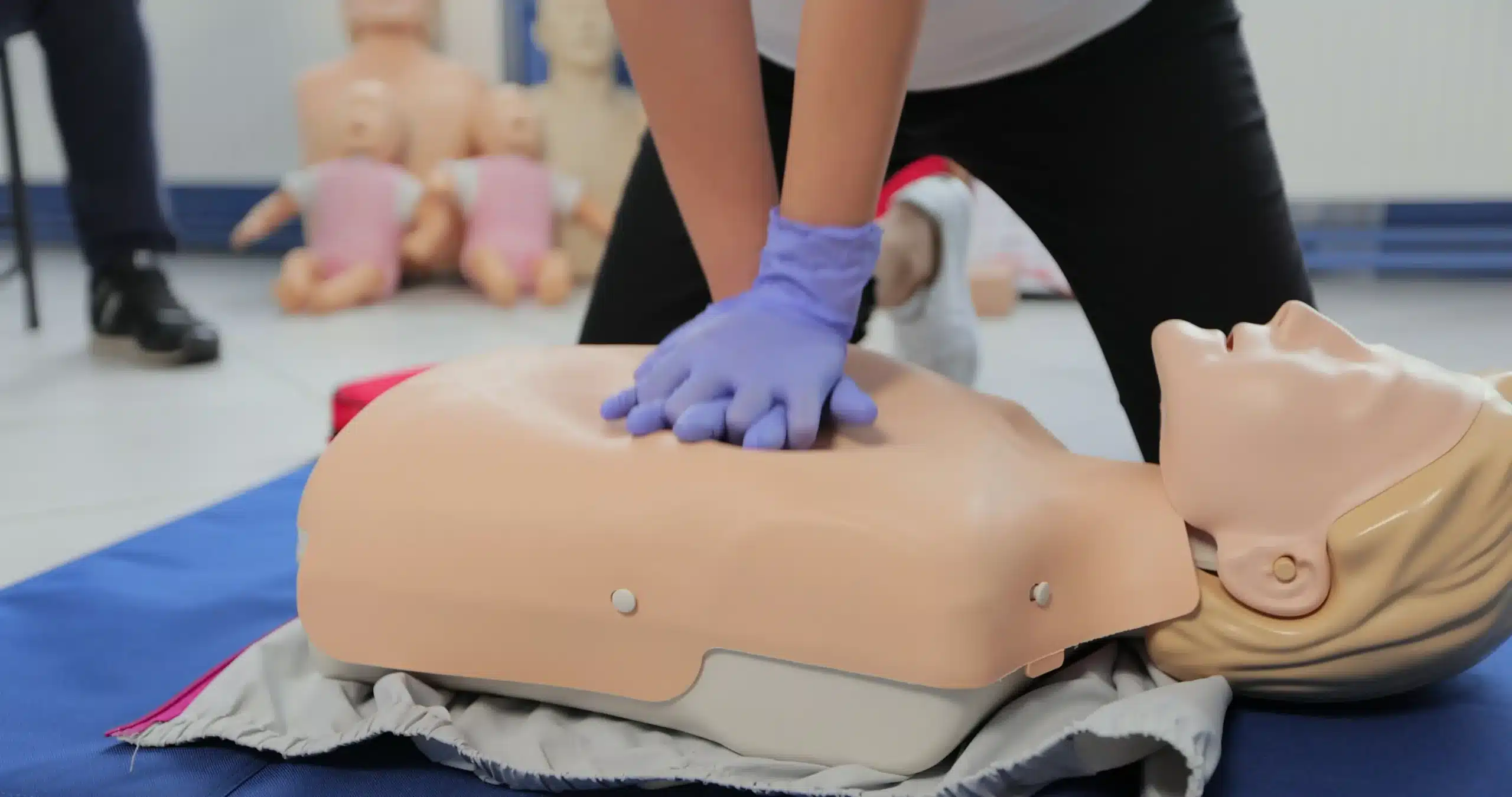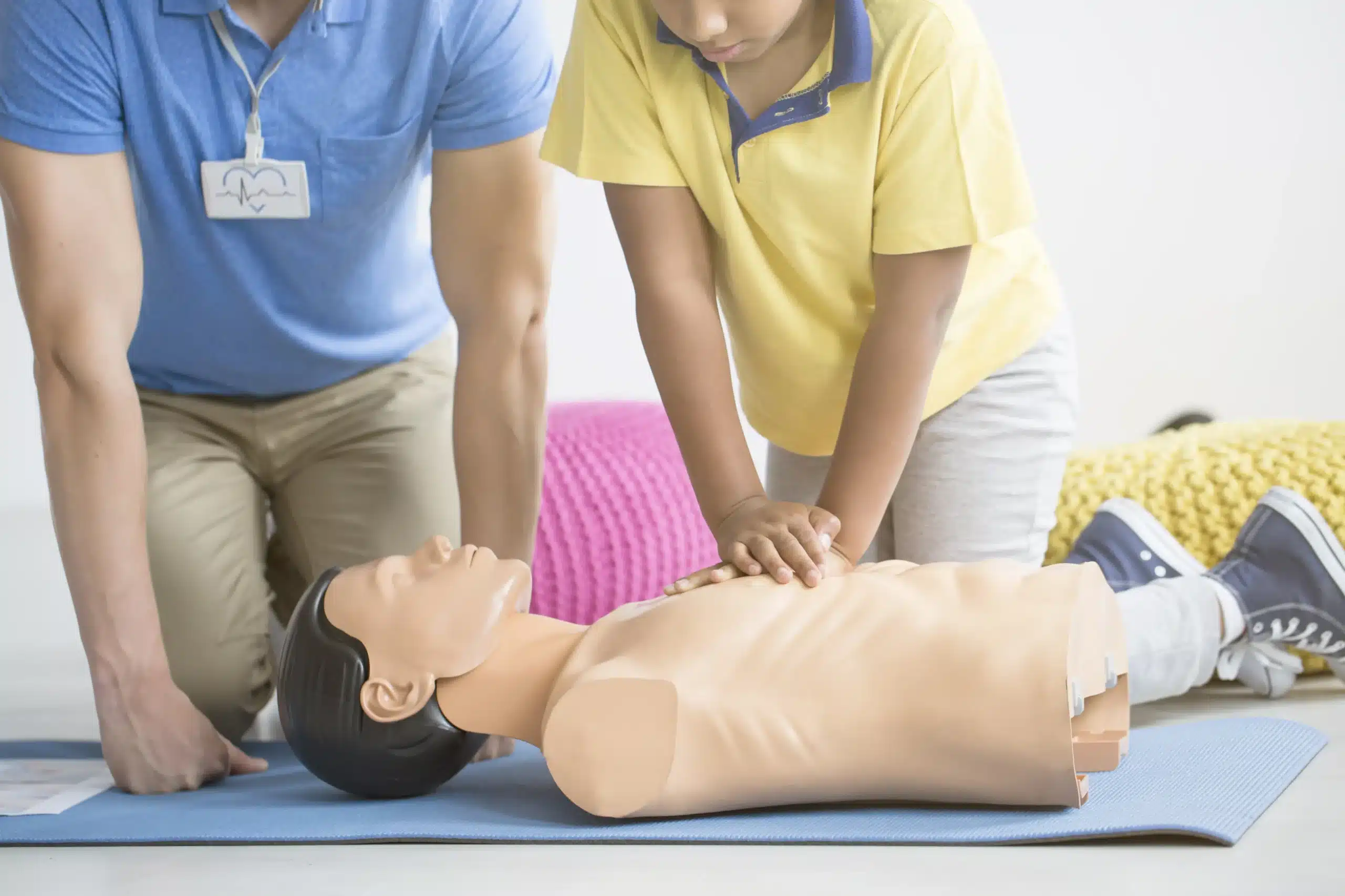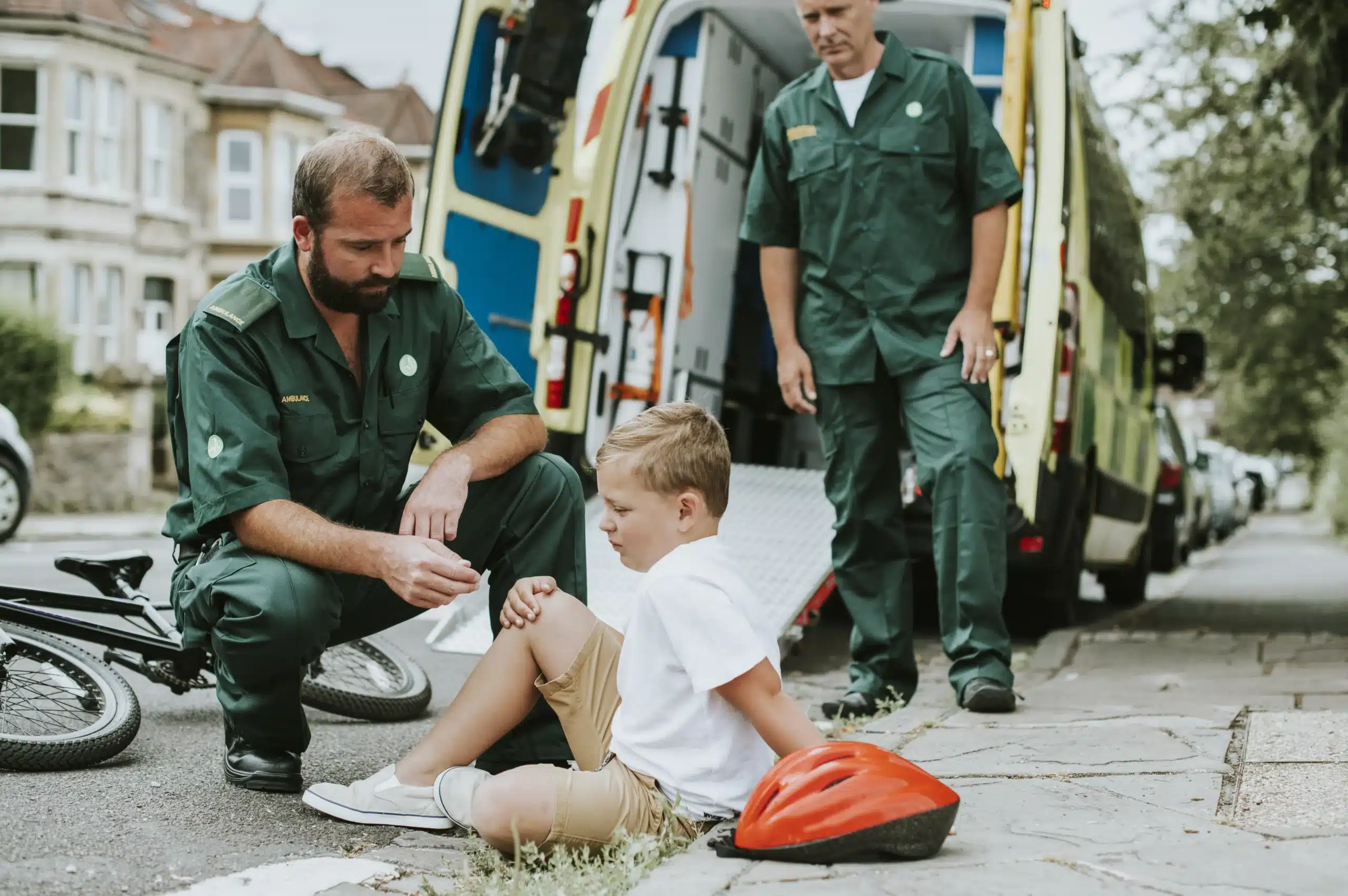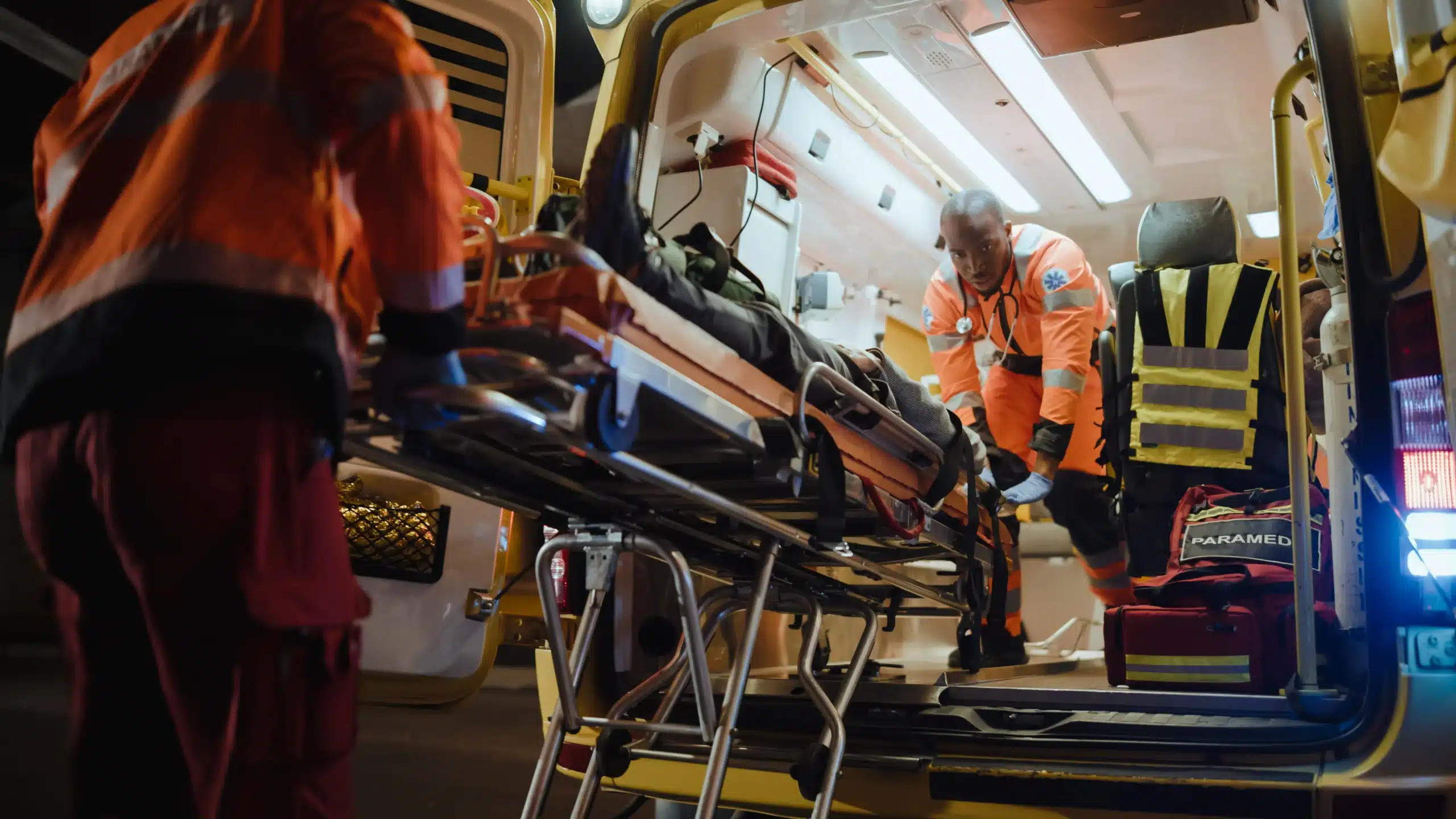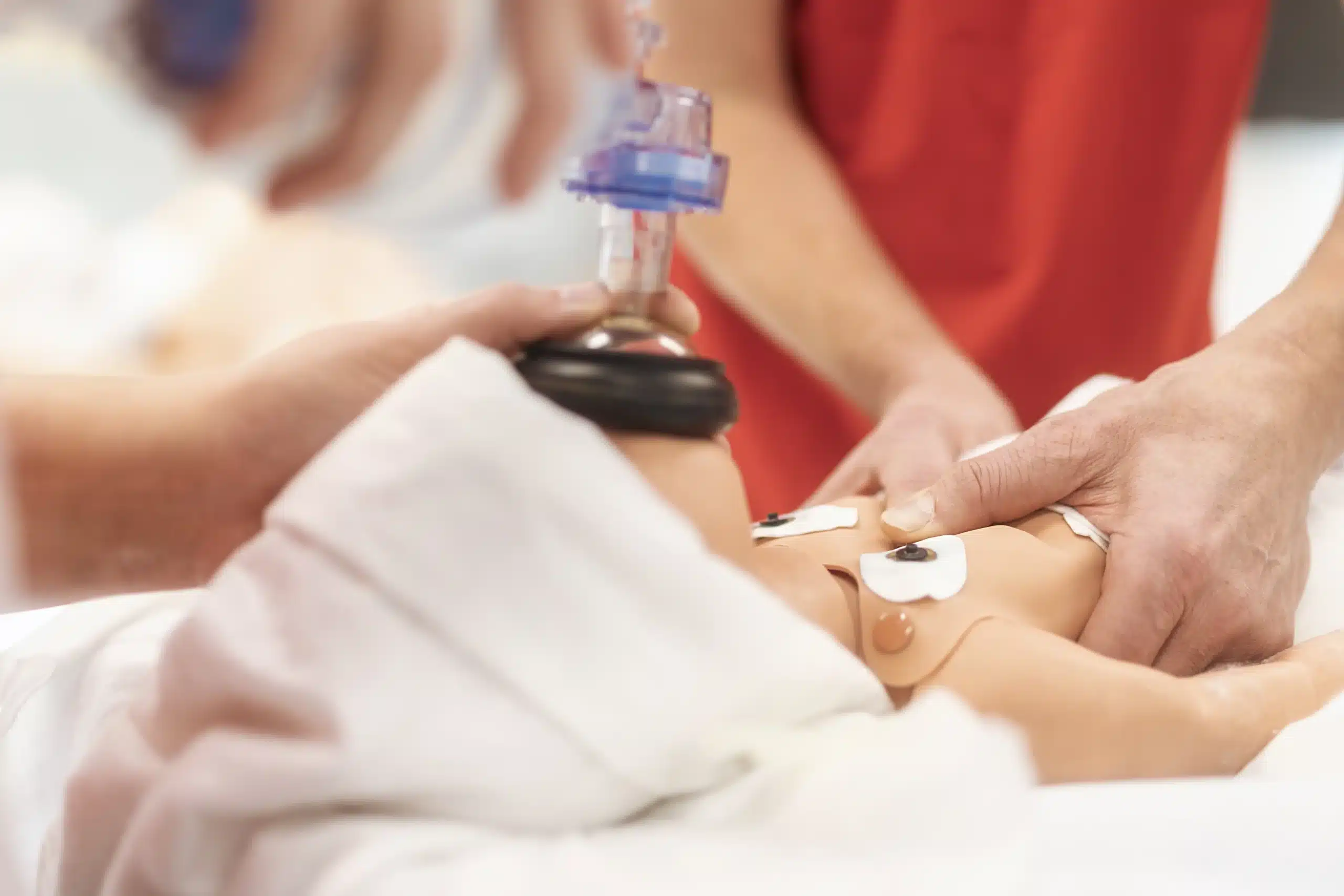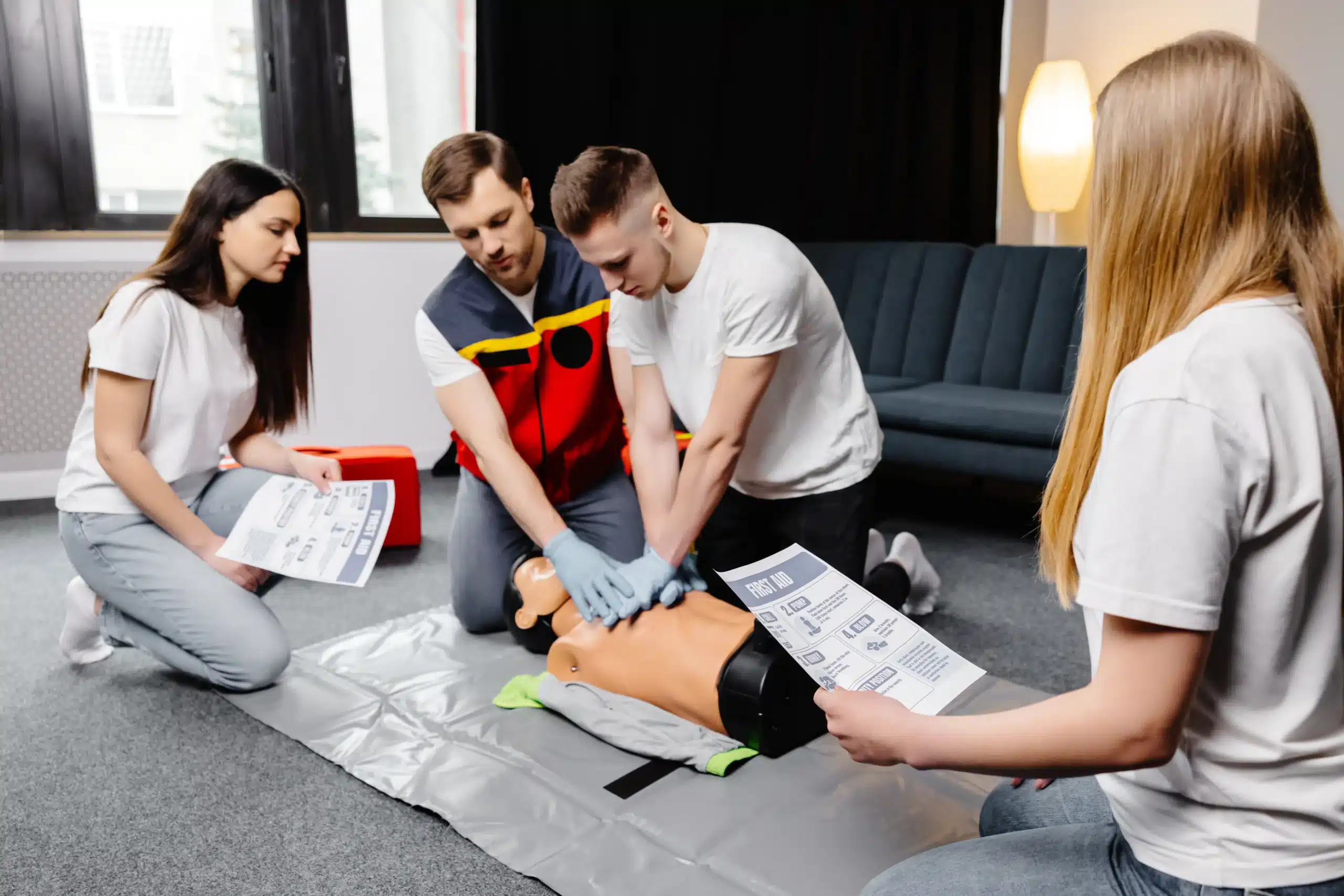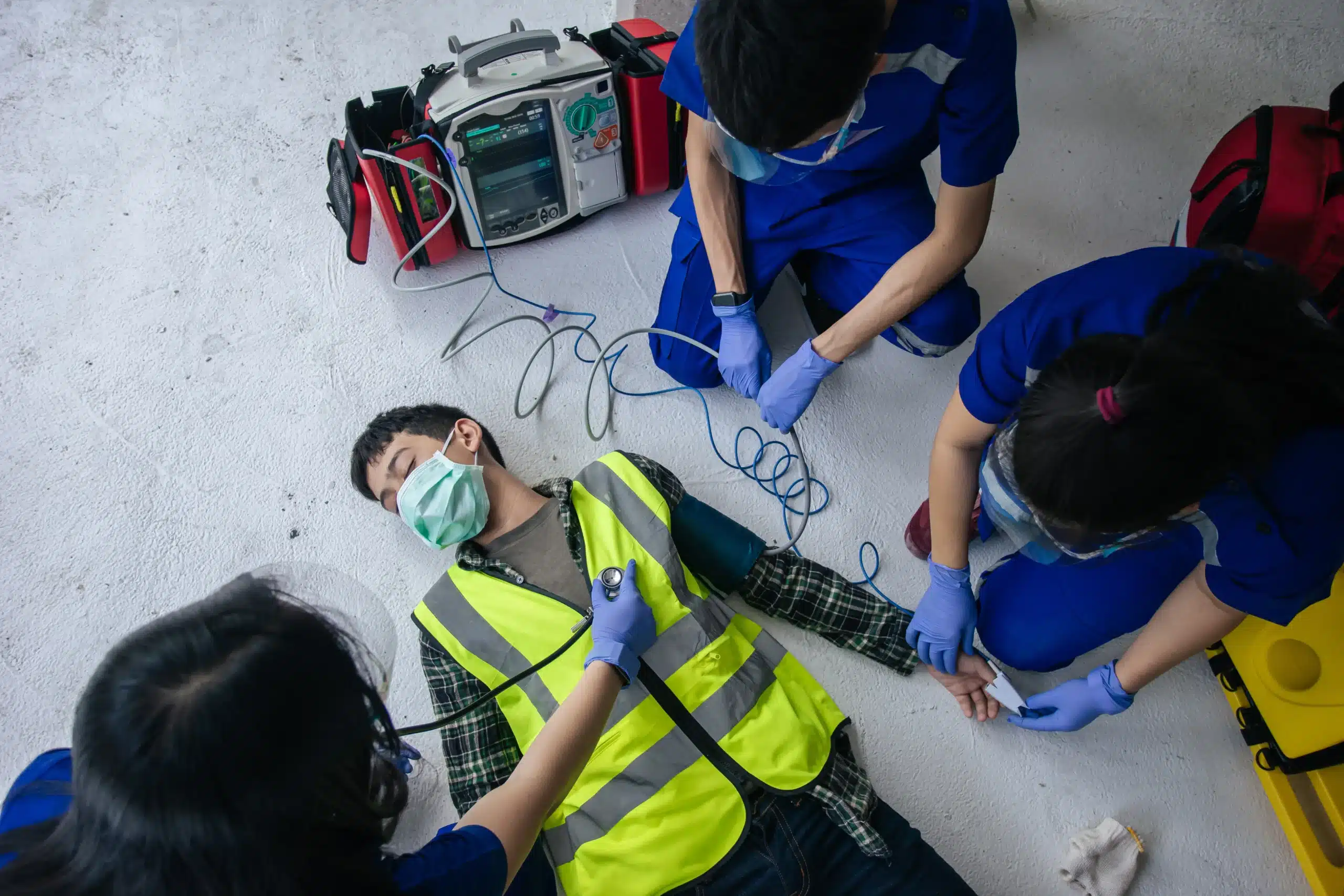Juggling work, family, and other commitments can make it tough to find time for essential training like CPR certification. That’s where the flexibility of online CPR classes in Morgan Hill comes in. These courses empower you to learn life-saving skills at your own pace, from the comfort of your home, or anywhere with an internet connection. This article serves as your comprehensive guide to online CPR training in Morgan Hill. We’ll cover everything from available courses and the certification process to choosing the right provider and understanding the pros and cons of online learning. Whether you’re a healthcare professional, a concerned parent, or simply someone who wants to be prepared, we’ll help you find the perfect online CPR class to fit your needs and lifestyle.
Key Takeaways
- Online CPR training fits your schedule and budget: Learn lifesaving skills conveniently and affordably, often at a lower cost than in-person classes. Blended learning options combine online coursework with hands-on practice.
- Credible certification matters: Choose an accredited provider like Morgan Hill CPR Classes for AHA-certified courses that meet national standards. Consider instructor experience and available resources.
- Continued learning is essential: Prepare for your online course by setting up a productive learning space and managing your time wisely. Maintain your skills with refresher courses and post-course resources.
What are Online CPR Classes in Morgan Hill?
Online CPR classes in Morgan Hill offer a flexible and convenient way to get your CPR certification. These courses fit easily into busy schedules, letting you learn at your own pace and from anywhere with an internet connection. This online format is especially helpful if you find it difficult to attend in-person classes because of time constraints or other commitments.
Often, online courses also have lower registration fees than traditional classroom training. Online learners frequently save money on registration. In Morgan Hill, several providers offer AHA-certified online courses, including Basic Life Support (BLS), Advanced Cardiovascular Life Support (ACLS), and Pediatric Advanced Life Support (PALS). These courses ensure you receive high-quality training that meets national standards.
For healthcare professionals in Morgan Hill looking for a comprehensive learning experience, the American Heart Association’s RQI (Resuscitation Quality Improvement) program is a popular and efficient way to get your official AHA BLS, ACLS, and PALS certification cards. It’s designed to keep your resuscitation skills sharp.
Available Online CPR Courses
Finding the right CPR class is easier than you think. Whether you’re a healthcare provider, a concerned parent, or just someone who wants to be prepared for emergencies, there’s a course out there for you. Let’s explore some options available through Morgan Hill CPR Classes.
CPR and First Aid
Morgan Hill CPR Classes offers comprehensive CPR and First Aid training certified by the American Heart Association. These courses cover essential life-saving techniques, from recognizing the signs of a heart attack to administering CPR and providing basic wound care. They’re designed to be accessible and affordable for individuals and groups in Morgan Hill, San Jose, and Gilroy. For those looking for a combined approach, the CPR/First Aid blended learning course allows you to complete a portion of the training online at your own pace, followed by an in-person skills session.
Basic Life Support (BLS)
Need a flexible schedule? Morgan Hill CPR Classes offers BLS classes seven days a week. This course provides healthcare providers with the skills and knowledge to perform high-quality CPR, use an AED, and relieve choking in adults, children, and infants. The flexible schedule makes it easy to fit this crucial training into your busy life. Check out their course prep page to make sure you’re ready for your class.
Advanced Cardiovascular Life Support (ACLS)
For healthcare professionals, Morgan Hill CPR Classes provides ACLS training through the American Heart Association. This advanced course focuses on the importance of high-performance team dynamics and communication in resuscitation, systems of care, recognition and intervention of cardiopulmonary arrest, immediate post-cardiac arrest, acute dysrhythmias, stroke, and acute coronary syndromes. Take advantage of their low price guarantee for the best value on your ACLS certification.
Pediatric Advanced Life Support (PALS)
If you work with children, PALS training from Morgan Hill CPR Classes is essential. This American Heart Association certified course equips you with the skills to respond to life-threatening emergencies in infants and children. You’ll learn how to assess a pediatric patient, provide effective respiratory and circulatory support, and manage common pediatric emergencies. Consider joining a group class for a discounted rate.
Weighing Online CPR Training: Pros & Cons
Deciding between online and in-person CPR training is a personal choice. Both have their own set of advantages and disadvantages. Understanding these can help you choose the best fit for your lifestyle, learning style, and career goals.
Advantages of Online Classes
Online CPR courses offer flexibility you won’t find in a traditional classroom. Busy schedules, family commitments, and geographical limitations become less of a hurdle when you can learn at your own pace, anytime, and anywhere. This convenience is a major draw for many, especially those juggling multiple responsibilities. Plus, online CPR certification is often more affordable, allowing you to gain these vital skills without breaking the bank. Lower registration fees make online learning attractive for those seeking cost-effective training.
Online vs. In-Person Training
While online learning offers convenience and affordability, in-person training provides a different kind of value. Hands-on practice with a qualified instructor, real-time feedback, and the opportunity to ask questions and learn from others in a structured environment are all hallmarks of in-person CPR training. This direct interaction can be especially beneficial for kinesthetic learners. The importance of this physical component is highlighted by providers like Kiss of Life Atlanta, who emphasize the value of hands-on learning. For some professions, like healthcare workers, in-person training is often preferred or even required due to the critical nature of their work and the need for proficiency in real-life scenarios, as explained by CPR Certification Jackson.
Debunking Common Misconceptions
One common misconception is that online CPR certification isn’t as valid as in-person training. This isn’t necessarily true. The key is to choose an accredited provider that meets the requirements of your workplace or organization. Ultimately, the best choice depends on your individual learning style and needs. If you’re pursuing a career in healthcare, however, in-person training is often the recommended path, ensuring you develop the practical skills and confidence needed for real-world medical situations. Consider your career aspirations and the specific requirements of your field when making your decision.
Getting Certified: The Online CPR Process
This section walks you through what to expect when pursuing online CPR certification. From course requirements and receiving your certification to renewal processes and employer recognition, we’ll cover the key aspects of getting certified.
Course Requirements
Online CPR classes typically involve self-paced learning modules combined with a hands-on skills assessment. For example, Morgan Hill CPR Classes offers a blended learning approach covering essential topics like BLS, ACLS, PALS, and First Aid. This prepares you for various real-life emergencies. The combined CPR and First Aid course costs $140, including online training, the skills test, and your certification card. You can find more information on course preparation on our website.
Certification Validity and Renewal
After completing your online modules and passing the in-person skills evaluation, you’ll receive your certification card, often on the same day. This provides immediate proof of your qualification. For healthcare professionals, first responders, and educators, maintaining current certifications is crucial. Renewal courses, such as BLS renewal, are designed to keep your skills and knowledge aligned with the latest guidelines. Check out our BLS renewal guide for more details.
Employer & Organizational Recognition
While in-person training offers a structured environment with immediate feedback, online CPR training provides unmatched flexibility. You can enroll anytime, anywhere, fitting the training around your schedule. Many employers accept online CPR certifications, especially when accredited by organizations like the American Heart Association. Be sure to confirm acceptance with your employer or organization beforehand. For those seeking in-person training options, explore our group discounts for added value.
Choosing an Online CPR Provider
Finding the right online CPR provider is key to a valuable learning experience. Here’s what to consider:
Accreditation and Recognition
First things first, confirm the courses are accredited by a recognized organization like the American Heart Association (AHA). Morgan Hill CPR Classes offers AHA-certified courses, ensuring your training meets national standards and is widely accepted. This is essential whether you’re a healthcare professional or simply want credible certification.
Course Content and Materials
A comprehensive curriculum is crucial. Look for courses covering essential life-saving skills and knowledge. Check if the provider offers resources like videos, practice tests, and downloadable materials to support your learning. The curriculum at Morgan Hill CPR Classes is known for its comprehensive approach, giving you the confidence to handle emergencies effectively.
Instructor Qualifications
Experienced, certified instructors make all the difference. Inquire about the instructors’ credentials and experience. Morgan Hill CPR Classes, a woman-owned AHA Training Center, prioritizes high-quality instruction, ensuring you learn from qualified professionals.
Technical Requirements
Before you enroll, understand the technical requirements. Do you need specific software or a certain type of device? Knowing this upfront prevents frustration. For instance, some online courses, like those offered by Morgan Hill CPR Classes, require a computer or tablet for the online portion. Clarifying these details ensures a smooth learning experience.
Top Online CPR Providers in Morgan Hill
Finding the right CPR certification course is crucial, whether you’re a healthcare professional or simply want to be prepared for emergencies. Here’s a look at some leading CPR training providers in Morgan Hill:
Morgan Hill CPR Classes
Morgan Hill CPR Classes offers convenient and affordable American Heart Association (AHA) certified courses, including BLS, ACLS, PALS, and First Aid. They prioritize accessibility, with options for individuals and discounted group rates. Serving Morgan Hill, San Jose, and Gilroy, they make it easy to find training that fits your schedule and budget.
American Red Cross
The American Red Cross provides a range of CPR and First Aid certification options, including online, in-person, and blended learning formats. This flexibility caters to different learning styles and schedules. While they offer comprehensive training, it’s important to note that their certifications are not AHA-aligned, which may be a requirement for some healthcare professionals.
American Heart Association
While the AHA doesn’t directly offer online courses, they set the standards for CPR training. Many providers, including Morgan Hill CPR Classes, base their curriculum on AHA guidelines. For healthcare providers, the AHA’s Resuscitation Quality Improvement (RQI) program offers a streamlined path to maintaining BLS, ACLS, and PALS certifications. More information on these certifications can be found on the Morgan Hill CPR Classes website.
Safety Training Seminars
Safety Training Seminars provides AHA-certified BLS, ACLS, PALS, and CPR classes in Morgan Hill. They offer daily classes and on-site training for groups, focusing on convenience and flexibility. This makes them a good option for businesses or organizations needing to certify multiple employees.
Pricing and Discounts
Knowing the cost of CPR certification and exploring available discounts helps you budget effectively. This section breaks down typical price ranges and potential savings.
Standard Pricing
The standard cost for a combined CPR and First Aid course in Morgan Hill is typically around $140. This usually covers online training, the in-person skills evaluation, and your certification card upon successful completion. Remember that pricing can vary based on the provider and the specific courses you choose. A standalone CPR course might have a different price than a combined CPR and First Aid class. Check with your chosen provider for their most up-to-date pricing. Morgan Hill CPR Classes lists their current rates on their website.
Group Discounts and Promotions
If you’re coordinating training for a group, look for providers offering discounts for group enrollments. This can significantly lower the per-person cost, a smart move for businesses training multiple employees or community groups getting certified together. Discounts for groups can make a real difference in your overall training budget.
Low Price Guarantee
Some CPR training providers offer a low-price guarantee, meaning they’ll match or beat competitor pricing. This assures you’re getting good value for your money. Morgan Hill CPR Classes offers this guarantee, giving you confidence that you’re receiving quality training at a competitive price. Before committing to a provider, compare prices and ask about any low-price guarantees or special offers.
Prepare for Your Online CPR Class
Getting ready for your online CPR class doesn’t require a lot, but a little preparation makes a difference. Setting yourself up for success means having the right equipment, a dedicated workspace, and a realistic plan for managing your time.
Required Equipment
For online CPR courses through the American Heart Association, you’ll need a computer or tablet. Smartphones aren’t compatible with these courses, so make sure your tech setup meets the requirements. For all the details, visit our course preparation page.
Create a Productive Learning Space
Find a quiet spot where you can focus without distractions. Consider what helps you concentrate. Is it a comfortable chair, good lighting, or having a notebook and pen at hand? Create a space dedicated to the class to make your learning time more productive. With flexible class times available seven days a week, you can choose what works best with your schedule—weekends, evenings, or even during a lunch break.
Manage Your Time Effectively
Online CPR training is flexible, but it still requires setting aside time to focus on the material. Before you begin, review the course outline and estimate how long each section will take. Break the coursework into smaller, manageable chunks, and schedule specific times to complete them. Knowing the total cost upfront also helps with planning. Our combined CPR and First Aid course costs $140, covering the online training, the required in-person skills testing, and your certification card. This allows you to budget your time and resources effectively.
Post-Course Support and Resources
After completing your CPR certification, continued learning and access to resources are key for maintaining your skills and confidence. Here’s what you should look for in a quality CPR training provider:
Access Course Materials
Reliable access to course materials after your training is essential for refreshing your knowledge and staying up-to-date. Providers like Morgan Hill CPR Classes offer the American Heart Association RQI (Resuscitation Quality Improvement) program, which gives participants access to a variety of these essential materials. This program offers medical and healthcare professionals in Morgan Hill a modern and efficient path to their official BLS, ACLS, and PALS certification cards. Look for providers who offer digital resources, like online manuals or refresher videos, so you can easily review key concepts whenever you need a refresher.
Take Refresher Courses
Even with initial certification, regular refresher courses are crucial for keeping your skills sharp. Morgan Hill CPR Classes offers BLS renewal courses designed for healthcare professionals, first responders, educators, and the general public. These courses reinforce core techniques and introduce any updated guidelines, ensuring you’re always prepared to respond effectively in an emergency. Check with your chosen provider about the frequency of refresher courses and how they can fit into your ongoing training.
Get Ongoing Instructor Support
Having access to instructor support after your course can make a real difference in your long-term confidence. Morgan Hill CPR Classes provides ongoing support and offers to conduct BLS, CPR, and First-aid training at your workplace. This kind of flexible, on-site training can be invaluable for organizations and individuals who need adaptable scheduling. When choosing a provider, inquire about post-course support options, such as Q&A sessions, mentor programs, or access to online communities where you can connect with instructors and other students.
Key Considerations for Choosing an Online CPR Class
Finding the right online CPR class involves a few key considerations. Think about your learning style, budget, and schedule to make the best choice for your needs.
First, consider how you learn best. Do you thrive in self-paced environments, or do you prefer more structured learning? Online CPR training offers flexibility, allowing you to learn from anywhere and enroll anytime. This makes online learning ideal for busy professionals or those with unpredictable schedules. If you value hands-on learning, some providers offer blended learning, combining online coursework with in-person skills sessions. This approach lets you learn the basics online and then practice your skills with a certified instructor. For a helpful comparison of online versus in-person CPR training, check out this article from Starting Hearts.
Cost is another important factor. Online CPR classes are often more budget-friendly than traditional in-person classes, saving you money on travel and other expenses. Look for providers with transparent pricing and consider available discounts, such as group rates or promotions. Morgan Hill CPR Classes offers a low-price guarantee, ensuring you get the best value for your training.
Finally, ensure the online CPR class meets your certification requirements. Check that the program is accredited and recognized by relevant organizations like the American Heart Association or the American Red Cross. For insights into the importance of accreditation, CPR Certification Jackson offers a helpful resource. Also, confirm the certification’s expiration date and any renewal requirements to maintain your credentials. Knowing these details upfront helps you select a program that aligns with your professional goals and ensures your certification is accepted wherever you need it.
Related Articles
- BLS CPR Classes in Morgan Hill, CA – Morgan Hill CPR Classes
- CPR Certification in San Jose: Your Complete Guide – Morgan Hill CPR Classes
- Why CPR is Critical in Modern Healthcare
- BLS Renewal in Morgan Hill: Your Essential Guide – Morgan Hill CPR Classes
- PALS Classes in Morgan Hill, CA – Morgan Hill CPR Classes
Frequently Asked Questions
Is online CPR certification as valid as in-person training?
Absolutely, provided you choose a course from an accredited provider like the American Heart Association. Make sure the certification meets the standards of your workplace or organization, as some professions may require or prefer in-person training.
What if I have a busy schedule and can’t attend regular classes?
Online CPR courses offer a flexible learning experience. You can study at your own pace, anytime, and anywhere you have an internet connection. This makes it much easier to fit the training around your existing commitments. Many providers also offer weekend and evening classes for in-person skills sessions.
How much does CPR certification cost?
Costs vary depending on the provider and the type of course. Combined CPR and First Aid courses typically cost around $140, covering online materials, in-person skills assessment, and your certification card. Many providers offer discounts for group registrations, so inquire about those if you’re training with colleagues or friends.
What’s the difference between BLS, ACLS, and PALS certification?
These certifications address different levels of emergency care. BLS (Basic Life Support) covers fundamental life-saving techniques for everyone. ACLS (Advanced Cardiovascular Life Support) is designed for healthcare professionals responding to cardiovascular emergencies. PALS (Pediatric Advanced Life Support) focuses on emergency care for infants and children. The right certification for you depends on your profession and specific needs.
What kind of support is available after I complete my online CPR course?
Reputable providers offer various post-course resources. Look for access to online materials for review, refresher courses to keep your skills current, and ongoing instructor support for any questions that may arise. Some providers also offer the RQI program, which provides a streamlined way for healthcare professionals to maintain their certifications.
